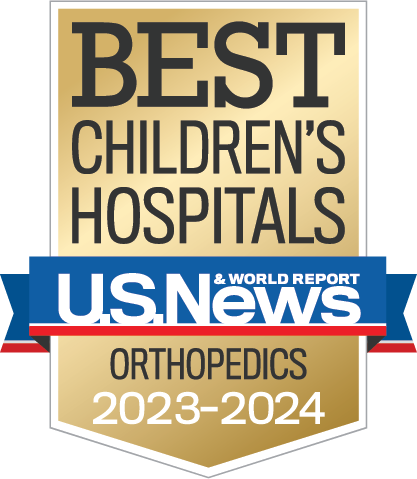- Doctors & Departments
-
Conditions & Advice
- Overview
- Conditions and Symptoms
- Symptom Checker
- Parent Resources
- The Connection Journey
- Calm A Crying Baby
- Sports Articles
- Dosage Tables
- Baby Guide
-
Your Visit
- Overview
- Prepare for Your Visit
- Your Overnight Stay
- Send a Cheer Card
- Family and Patient Resources
- Patient Cost Estimate
- Insurance and Financial Resources
- Online Bill Pay
- Medical Records
- Policies and Procedures
- We Ask Because We Care
Click to find the locations nearest youFind locations by region
See all locations -
Community
- Overview
- Addressing the Youth Mental Health Crisis
- Calendar of Events
- Child Health Advocacy
- Community Health
- Community Partners
- Corporate Relations
- Global Health
- Patient Advocacy
- Patient Stories
- Pediatric Affiliations
- Support Children’s Colorado
- Specialty Outreach Clinics
Your Support Matters
Upcoming Events
The Rosenberry Annual Conference: Pediatric Anxiety - Exploring Innovative Evidence Based Treatments (Hybrid)
Friday, May 3, 2024This conference will review innovative and evidence-based treatment for...
-
Research & Innovation
- Overview
- Pediatric Clinical Trials
- Q: Pediatric Health Advances
- Discoveries and Milestones
- Training and Internships
- Academic Affiliation
- Investigator Resources
- Funding Opportunities
- Center For Innovation
- Support Our Research
- Research Areas

It starts with a Q:
For the latest cutting-edge research, innovative collaborations and remarkable discoveries in child health, read stories from across all our areas of study in Q: Advances and Answers in Pediatric Health.


Concussion Program
Brain Injury in Kids
Kids aren’t just mini adults. In fact, they’re incredibly different. That’s why they need incredibly different care.

Get Care Now
From emergency to urgent care to 24/7 pediatric advice, we’re here to help in the heat of moment.
What is a brain injury?
A brain injury is any injury to the brain that can result in a temporary or permanent alteration in functional ability. It is caused by structural damage to the brain or a change in normal brain cell functions and activities that define how the brain works.
These changes can affect cognitive and behavioral functions, as well as physical capabilities that allow a person to move and interact with the environment. Injuries to the brain may range from very mild, with little change in function, to the very severe, causing extensive functional impairment and thus requiring extensive care and hospitalization.
What causes brain injuries in kids and young adults?
Brain injuries can be caused in a number of ways. For example, a blow to the head (known as trauma) from hitting a windshield in a car crash, falling while skateboarding, or hitting your head in a soccer game can damage the brain. This is called traumatic brain injury (TBI) and is what most people think of as "brain injury."
The brain, however, can be damaged in many other ways besides trauma, such as by drowning (lack of oxygen to the brain), stroke (bursting of a blood vessel in the brain), infection of the brain, a tumor (unregulated growth in the brain), and/or drug toxicity or chemical poisoning (abuse, accidental overdose or exposure).
What's the difference between a concussion and a brain injury?
Concussion is a milder brain injury caused by an impact to the body or the head resulting in temporary changes in mental status like confusion, disorientation, loss of memory for periods immediately before or after the event, or brief loss of consciousness. Headaches, difficulty concentrating, memory problems and other symptoms may follow a concussion and are usually short-lived (but may last for many weeks or months in some cases). Usually no structural brain damage is identified.
In moderate to severe brain injuries, changes in brain function are more extensive and can be longer lasting and/or permanent. Identifiable structural brain damage is common.
Who gets brain injuries?
A brain injury can happen to anyone, regardless of age, race, ethnicity or gender.
What are the signs and symptoms of a brain injury?
A brain injury can affect a person in many ways and can vary significantly depending on the severity, cause and area of the brain injured.
Things as subtle as headaches, mood swings and memory problems are often associated with a milder brain injury or concussion, while significant changes in movement, behavior, ability or even unconsciousness can result from a more severe injury.
What tests are used to diagnose a pediatric brain injury?
The most important brain injury test is the conversation a patient and family has with your healthcare provider. You'll be asked to share things like what happened, how your child felt right after the injury, how does he/she feel now and/or how does he/she feel currently that is different from before it happened. After this discussion and a thorough history and physical exam, other tests may be ordered for your child or young adult.
Another common way to diagnose brain injury is with neuroimaging techniques. This gives doctors a "picture" of your child's brain to look for evidence of damage. The damage may be evaluated by looking at the blood vessels, structure of different areas and connections, abnormal collections of fluids like blood, and chemical processes in the brain, among other things. These pictures are commonly obtained by using X-rays (CT scan), large magnetic fields (MRI) and/or sound (ultrasound).
In some cases after an injury, the brain begins to undergo unregulated, disorganized electrical activity called a seizure. A test called electroencephalography (EEG) provides a very detailed view of the electrical activity in the brain and tells doctors how it differs from normal activity. This allows your child’s care team to diagnose problems, determine if treatment is needed, and assess if that treatment is effective.
Neuropsychological testing
A brain injury often affects how a person thinks and behaves, which is why your child might also undergo a thorough neuropsychological exam at Children's Hospital Colorado. This type of testing will help your child’s doctors find out if there are any problems with thinking, learning, talking or processing information. This evaluation includes interviews, observation of behavior and performance on focused tasks to help identify specific functional problems. Learn more about neuropsychological testing at Children's Colorado.
Because a brain injury can possibly disrupt all the other systems of the body, many different kinds of problems may also occur. Therefore, other more specific diagnostic tests may be done to evaluate those issues.
Read about common tests used at the Neuroscience Institute.
Why choose Children's Colorado for brain injury testing?
Children's Colorado has the most extensive and current selection of brain injury diagnostic programs in the Rocky Mountain region. Our experience in the testing and treatment of brain injury is unmatched in the region.
Our team approach allows us to get a complete picture of your child's health, and then work together to identify the best treatment options. Our team also consists of leading researchers, which allows us to improve and define standards for pediatric brain injury diagnosis and care.
How is a brain injury diagnosed at Children's Colorado?
After reviewing your child's physical exam, patient history, neuroimaging, EEG, psychological evaluation and other tests, the Brain Injury Team will sit down with your family to discuss the best treatment options for your child.
Pediatric experts from the multidisciplinary care team will assess your child’s injury from multiple points of view and help you understand how the injury may impact the many different areas of function.
How is a brain injury treated?
There are multiple programs available at Children's Colorado for the treatment of a brain injury. For milder brain injuries (also called concussions), we have a separate Concussion Program for kids, adolescents and young athletes. For more severe brain injuries, we have a large Inpatient Brain Injury Program staffed by a multidisciplinary group of physicians, nurses, therapists and other clinicians specifically trained in the care of children with brain injuries.
In addition, after your child is discharged from the hospital, he or she will transition to a specialty Outpatient Brain Injury Program designed to provide follow-up care, long-term treatment, and guide your child and family through the recovery process.
For patients who have long-term problems, we continue to see them on a regular basis in our Outpatient Brain Injury Program with a goal of maximizing their capabilities and health. In addition, our social services experts are involved in the overall treatment plans, as we know that such complex injuries impact the whole family.
Why choose Children's Colorado for your child's brain injury?
What makes the Children's Colorado Brain Injury Program unique is our individualized approach to patient care. Every member of our large, multidisciplinary team is involved in the treatment and care of your child by contributing their unique areas of pediatric expertise. We, as a group, will work tirelessly to help your child and family through the recovery process both while you're here in the hospital and after in our Outpatient Brain Injury Clinic.
Members of our care team are experts in this field and provide brain injury care on a daily basis. The comprehensive care and expertise we offer is unmatched in our region, and we strive to help children with brain injuries heal and lead as normal and healthy life as possible.
-
Would you like to learn more about us?
Learn more about the Concussion Program -
Are you ready to schedule an appointment?
Schedule an appointment -
Do you need an appointment or have a question?
720-777-2806

Compassionate care, wherever you are
We’re here when you need us. Telehealth appointments are available across every specialty, so you can get the high-quality care we’ve always offered from the comfort, privacy and convenience of home.
See if telehealth is right for you
Get to know our pediatric experts.

Jennifer Coffman, CPNP-AC
Certified Pediatric Nurse Practitioner

Brian A. Shaw, MD
Orthopaedic Surgery

Angelina Koehler, CPNP-PC
Certified Pediatric Nurse Practitioner

Mark Erickson, MD
Orthopaedic Surgery



 720-777-0123
720-777-0123



